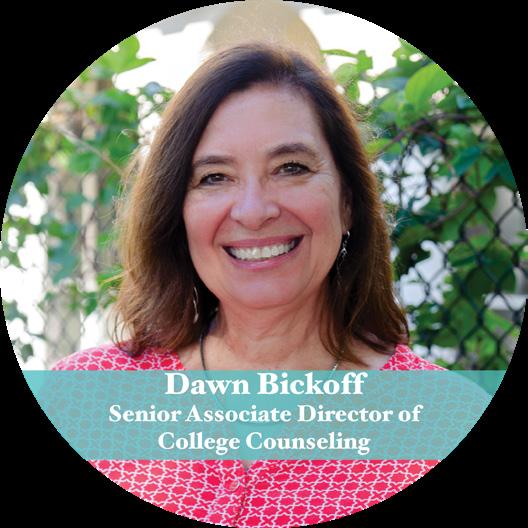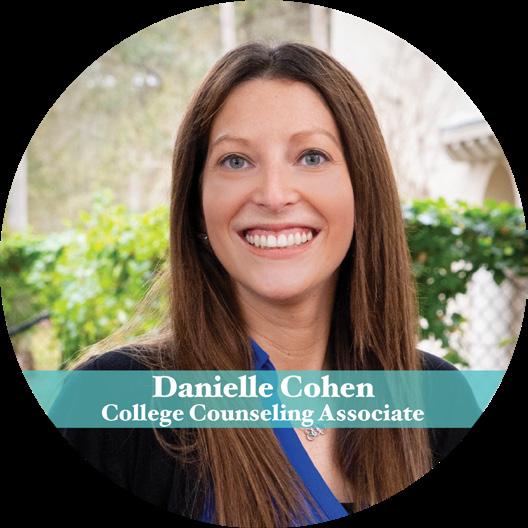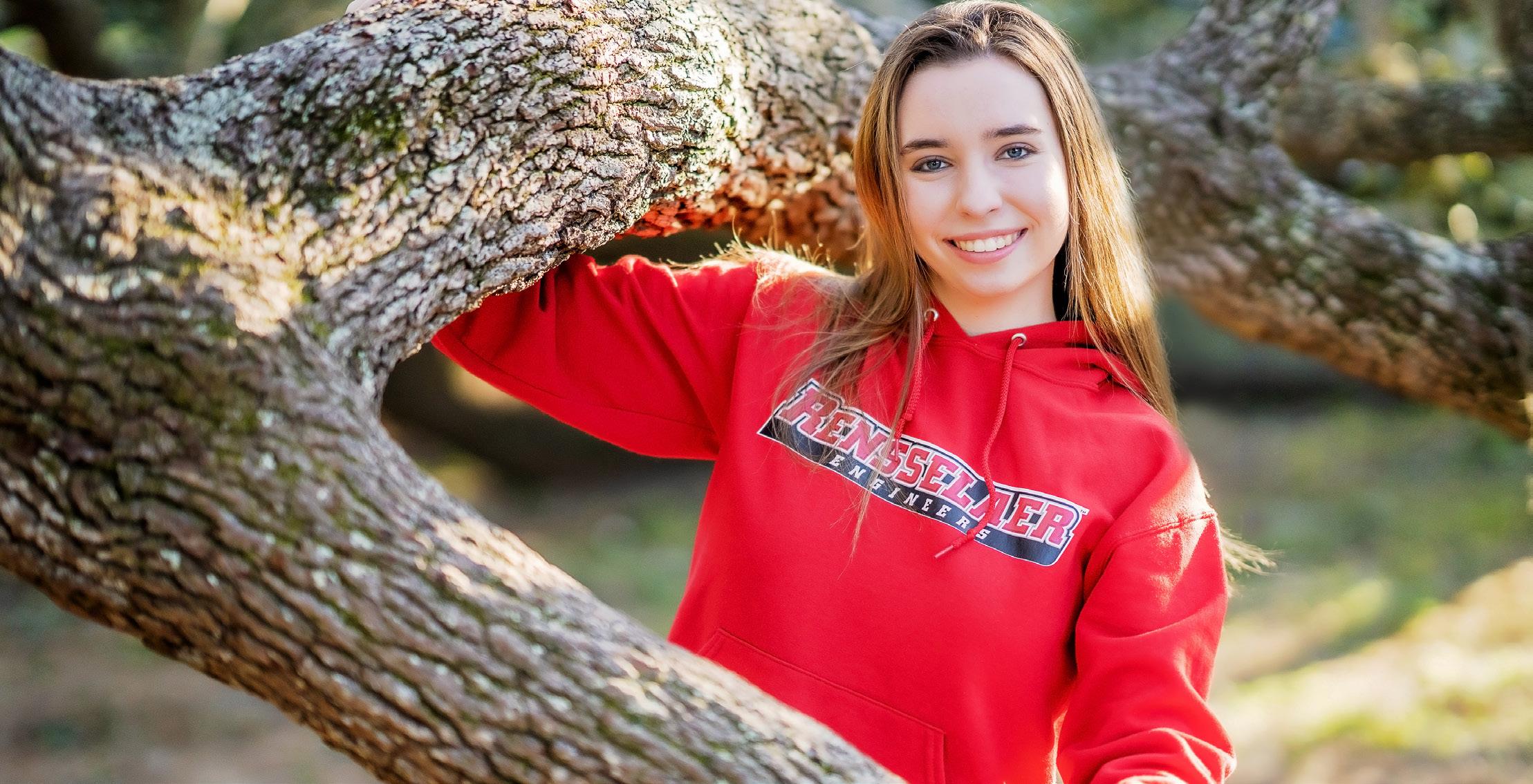
30 minute read
CDS HAS A NEW HEAD OF SCHOOL
ONE SIZE DOES NOT FIT ALL
With so many types of students who walk our halls, the goal is to meet the needs and goals of all of them, individually. CDS focuses on each student’s COMPETITIVE BEST FIT. This is one of CDS’ greatest strengths.
CDS GRADUATE
CDS Courses + Exams
Most Flexible Schedule
• Allows for more opportunities outside of school such as internships and jobs • CDS Final Exams Senior Year • GPA, SAT/ACT test scores & service hours determine Florida
Bright Futures Scholarship eligibility
While we always begin with the end in mind, the end being graduation, the beginning sets the tone for that successful ending. To that end, naturally, CDS begins at our Early Childhood Campus with a program that nurtures curiosity and confidence and continues to teach our students to ask those big questions. The IB Primary Years Programme (PYP) takes our preschoolers through 5th graders and develops skills like self-directed learning, motivation, and confidence. The program establishes life long learning with subjects of world languages, music, science, math, and many more.
As the students head into the Middle Years Programme (MYP) they are encouraged to be risktakers and empathetic citizens that help them discover new strengths and interests that will lead to community and global impact. With the middle school years being the bridge between elementary and upper school programming, these years are designed to foster hands-on learning, self-advocacy, and independence. All the while pushing the students to their full potential academically.
By the time our students reach the upper school, they have an academic plan for their four years, they have started the college counseling process, and they have a clear path to the goal they want to achieve by graduation. Our graduates, whether full IB, course candidates, or CDS diploma graduates, leave CDS ready for the next stage in life. We are proud to continue the trend of 100% of our CDS graduates since 2009 accepted to a 4-year college.
CDS + IB GRADUATE
CDS + IB FULL DIPLOMA
Some IB Courses + Tests More Flexible
• Full school days - Limited availability for outside internships • IB Testing in courses of student choosing • GPA, SAT/ACT test scores & service hours determine Florida
Bright Futures Scholarship eligibility
All IB Courses, IB Core
Requirements + IB Exams
• Full school days - Limited availability for outside internships • IB Testing in all six subjects • Award of IB Diploma and service hours entitle student to receive top tier of Florida Bright
Futures Scholarship
Students should select a Graduation pathway that fits their personal interests, academic aptitude, & college ambitions.
Creating a Competitive Best Fit
We live in a playlist world. One where people pick and choose what works for them. That is what CDS has done for our students. We give them the ability to choose what path will help them exceed their goals.
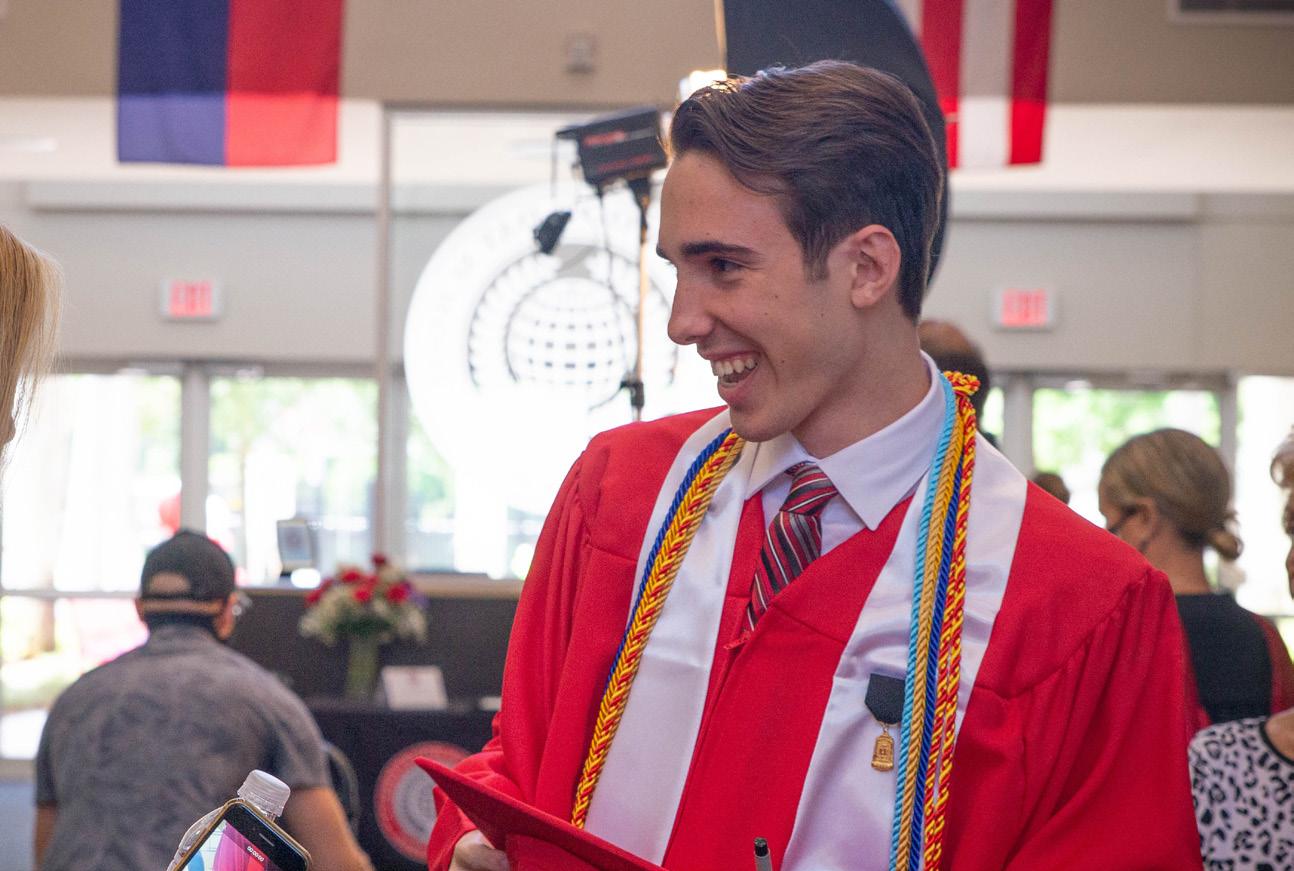
THE CHOICE IS UP TO YOU
10 Reasons WHY IB
1. It increases academic
opportunity: Research shows that DP graduates are much more likely to be enrolled at top higher education institutions than entrants holding other qualifications*.
2. IB students care about more than just results:
Through creativity, action, service, (CAS) you learn outside the classroom and develop emotionally and ethically as well as intellectually.
3. It encourages you to become a confident and independent
learner: For example, the extended essay requires independent research through an in-depth study.
4. It’s an international
qualification: The DP is recognized globally by universities and employers.
5. Graduates are global
minded: Language classes encourage an international mindset, key for increasingly globalized societies.
6. The IB encourages critical thinking:
Learn how to analyze and evaluate issues, generate ideas and consider new perspectives
7. DP Students have proven time management skills:
Take good study habits and strong time management to further education and the working world.
8. It assesses more than examination
techniques: Learn to understand, not just memorize facts or topics and prepare for exams.
9. Subjects are not taught
in isolation: Theory of knowledge (TOK) classes encourage you to make connections between subjects.
10. It encourages breadth and depth of learning:
You are able to choose courses from six subject groups and study subjects at different levels.
*Based on IB research-IBO Research
“We are uniformly impressed by the quality and rigor of the IB curriculum. Students with an IB Diploma are well prepared to make the most of their university experience.” Spring 2020 Talon C. Bryan Young, Ph.D., P.E., Director and Associate Professor, University of Kansas Honors Program
THE WONDER
of the ECC The moment you walk into the CDS Early Childhood Campus the feeling of joy and wonder is palpable. You’ll often find various CDS staff members making “excuses” to visit on any given day because it is truly a special place. Using the IB Primary Years Programme (PYP) inquiry-based, transdisciplinary curriculum, in their ability to control what they are capable of, students are gaining conceptual understanding of they are more successful learners, and more active various subjects and teachers are able to use the participants in their learning environment. This student-centered approach to education. continues well past their years at the ECC. In fact our goal at CDS is for our students to carry that childlike At the ECC, the students are active participants of wonder with them through their entire educational their own learning and make choices in the learning careers, and beyond. process. One of the biggest goals at the ECC is selfefficacy. Once the children have gained confidence

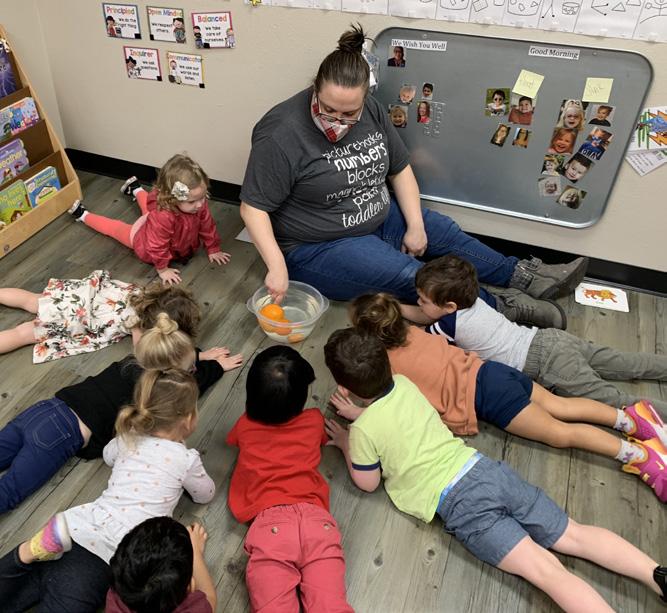
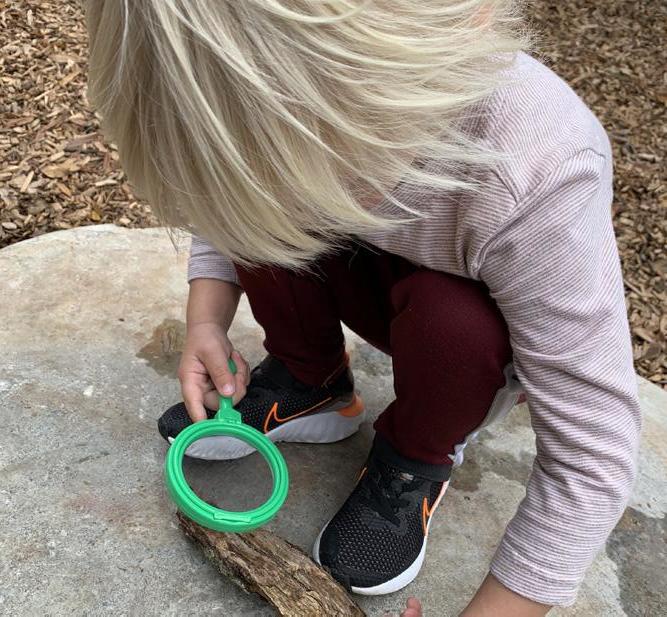
TODDLERS
The Toddler class is currently in our unit, Exploring We Will Go. We inquire into animals and their habitats, weather and its patterns, cause and effect, and an introduction into hypotheses. We examine the playground and our homes to find similarities and differences. We use technology to further inquire into animal habitats. We use tools, such as the water table and magnifying glasses, to form early science skills. We conduct experiments to introduce trial and error. In one of the experiments above, we explored how the peel of the orange causes it to float, regardless of size. The children made initial predictions whether the oranges would sink or float. We drew comparisons to our floaties or life jackets we use in the pool. Our IB Learner Profile characteristics for this unit are inquirer and risk taker. We discuss what being brave looks like and how scientists discover by trying new things. We love this unit!

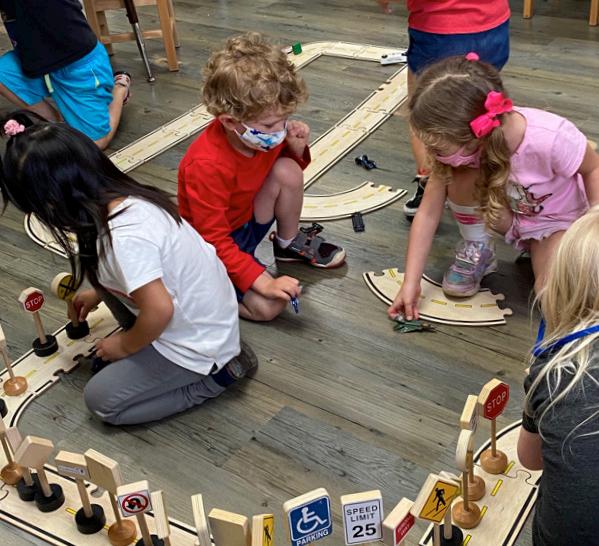
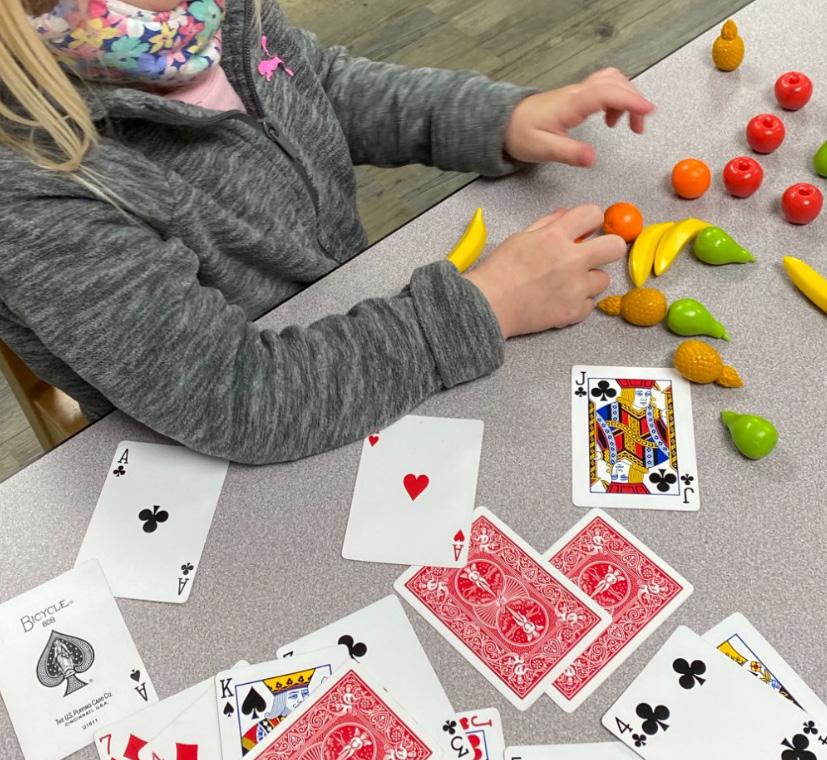
PreK 3
We are currently focusing on our Signs and Symbols PYP Unit of Inquiry in PreK 3. Students began this unit by looking at photographs and reading books about community signs and symbols. Understanding the meaning of signs that children encounter, not only at school but when they are in the community, provides them empowering knowledge. As homework, children took home a little homemade book of the community signs they might see while out and about with their families. Children crossed off the signs and symbols they saw and then brought those books back to school to share with classmates. In addition, we are spending our small group times doing activities that increase children’s understanding of number and letter identification. Our children are exploring and in doing so they acquire knowledge and develop a broadening understanding and awareness of their world. Our Signs and Symbols unit of Inquiry is giving children a greater understanding of the connections between letters, numbers and signs, and the messages they give us.
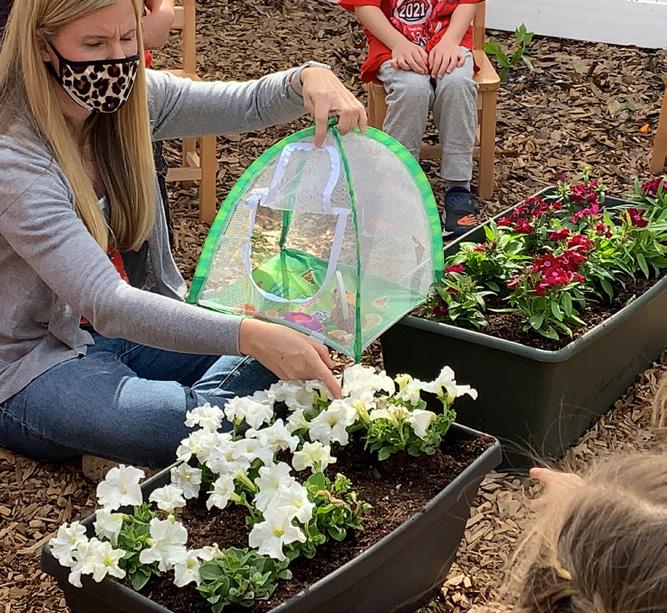


PreK 4
PreK 4 is currently in their unit, I Wonder Why. This is our science driven unit that encompasses so many amazing learning opportunities for our students. We have spent the last month and a half learning about the life cycle of the ladybug and the butterfly. We have read amazing books and watched videos about the lifecycles, while also having the opportunity to observe the lifecycles in the classroom. The students were able to observe the changes the ladybugs and butterflies went through during their life cycles. The students were excited and anxious each day when they arrived to see what may have taken place overnight. The biggest delight was watching both the adult ladybug and butterfly emerge from the pupa stage. It was magical! As the changes were taking place, the students also learned to journal the changes they were observing through drawings. The final piece of our lifecycle study was a garden to release our butterflies and ladybugs in. The students enjoyed planting their own flower and wishing their new friends well before saying goodbye. Next we will begin to study and learn all about the human body!
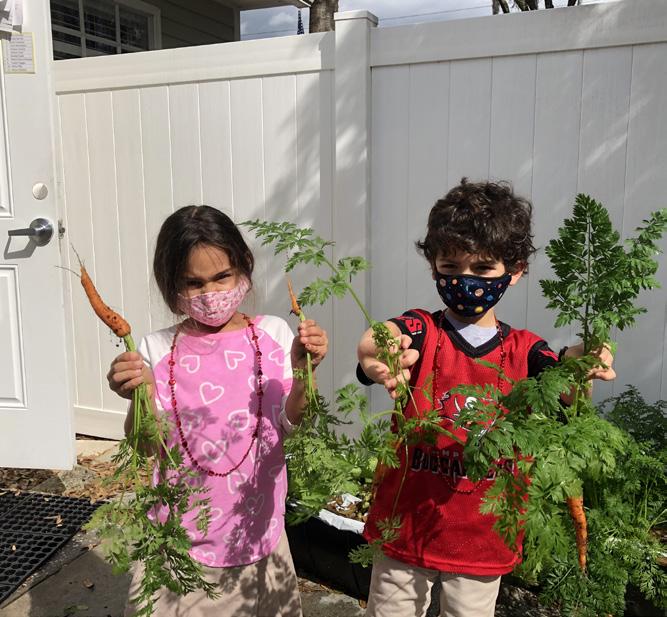
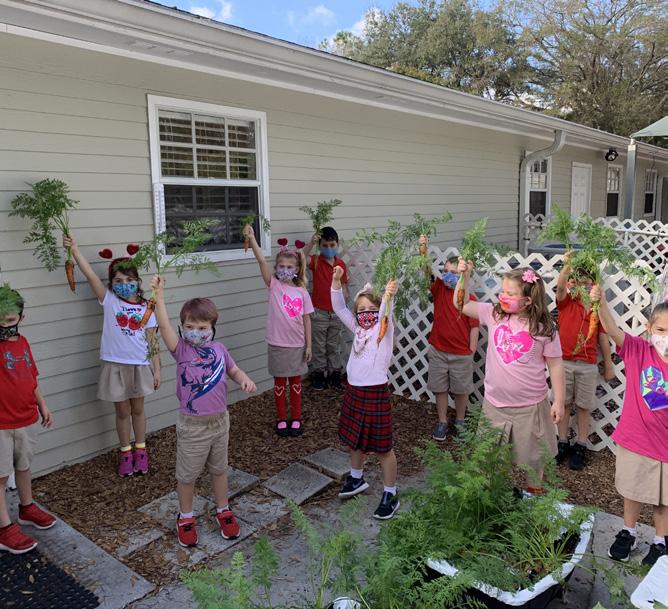
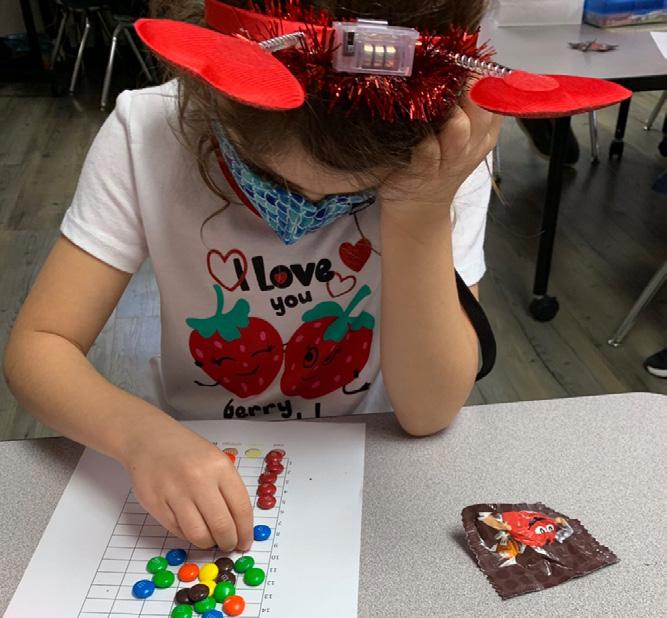
Kindergarten
Kindergarten’s current Unit of Inquiry is under the theme of Sharing the Planet with the central idea of animal survival is dependent on their habitat. Students started by first talking with each other about the words safe, threatened, endangered and extinct. By using the approaches to learning skills - thinking, research and communication - we are learning about habitats, endangered animals, and personal responsibility. It’s always inspiring watching the students wonder and look for ways to find the answers. We also create mind maps to show our understanding of the information. This unit will culminate with a research project with each student choosing an endangered animal. The teachers created a virtual trip for them to Zoo Tampa this year and they will use these videos and other research material to create a final project on their animal. Once completed, each student will then present their project to the whole class. They are so excited to share their information and have become quite passionate about making a difference to prevent habitat destruction and animal poaching.
CATCHING UP WITH
ELEMENTARY
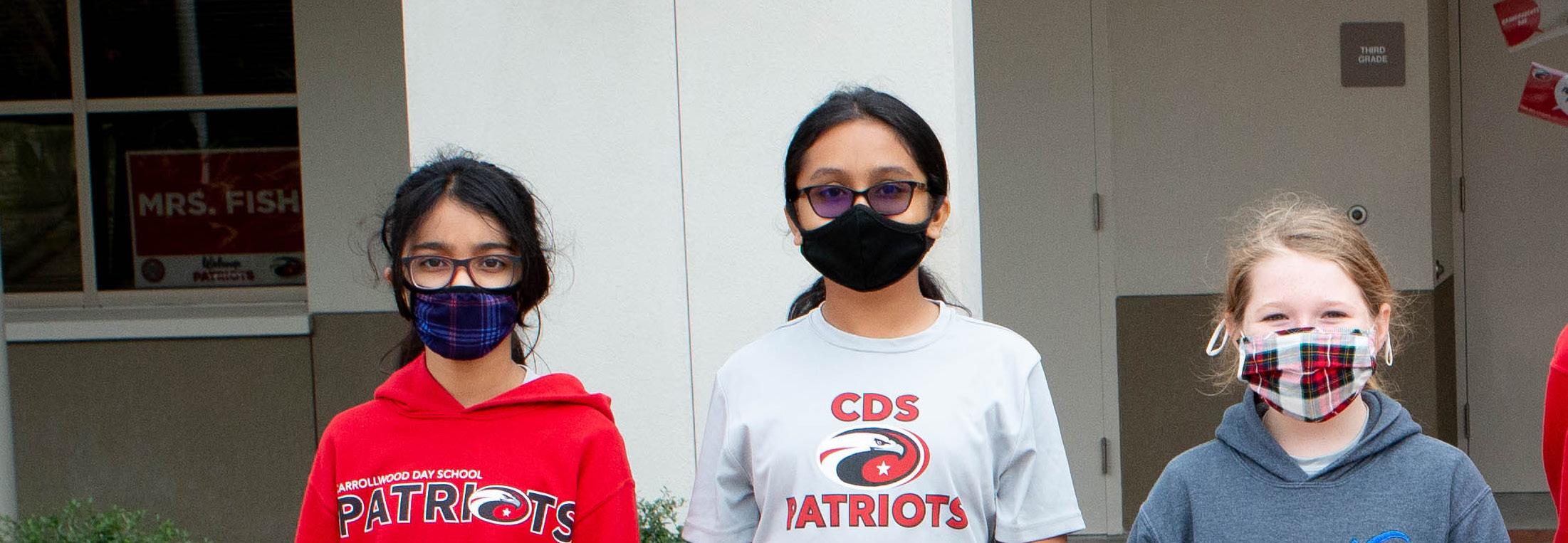
Each December, CDS students in grades 1-5 celebrate Computer Science Education Week. Using the Hour of Code initiative as a springboard, students spend a month delving into coding. They learn the basics of functions, loops, and if/then conditional statements through fun online puzzles and programs. Hopefully, this introduction sparks an interest by the student to complete independently the entire Code.org Express Course.
We are pleased to recognize two of our fifth grade students, Gabriella N. and Denah L., who were the first to complete this 12-15 hour course in less than a month.
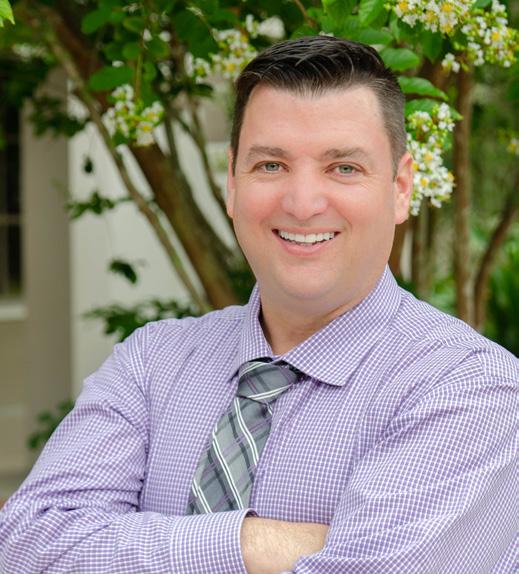
< CODE LIKE A PATRIOT >
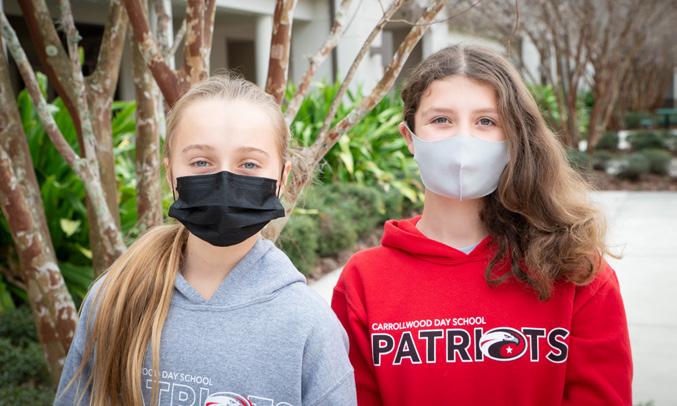
This accomplishment is more impressive knowing that prior to coming to Carrollwood Day School this year, Gabriella and Denah had never worked with Code.org.
“What I love most about this module is how it aligns to many of our IB Learner Profiles: being a Risk Taker, an Inquirer, a Thinker and Reflective”, says their tech teacher Mr. McGrath. “We approach unfamiliar situations with courage, develop natural curiosity, think critically and creatively, and consider what worked well and what could be improved upon in the process, all while having a bit of fun.”
Curiosity in coding has piqued in fourth grade as well. Ishani G., Lamees S., and Gabby Z., are surveying interest in third, 3:30-4:15. “We wanted to start a club so that we could be with friends and continue coding. ” says Gabby.
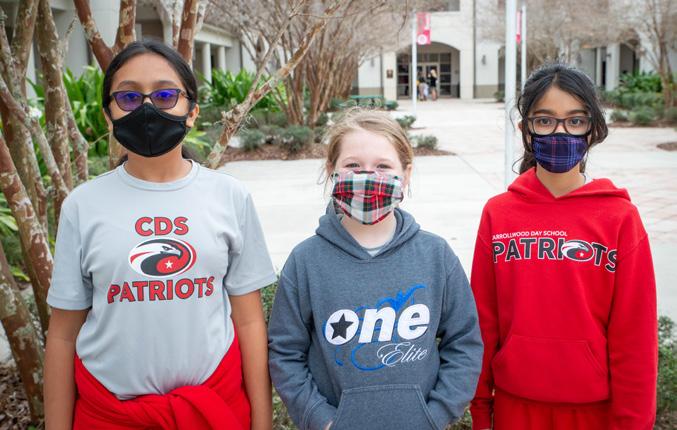
Coding isn’t happening just on campus. FIfth grader, Sophia O., during her time learning from home, decided to do more than just play Roblox. Coupling knowledge from Code.org with, in her words, “hours of Youtube tutorials”, Sophia has been exploring the script-based language, Lua, and making her own games in Roblox Studio. According to Sophia, “Being able to create, modify, and have others play different adaptations of my work has been a real creative outlet.” ---------------------Thank you to Elementary Computer Teacher, Bryan McGrath, for inspiring the love for computers in our students and for contributing this article.

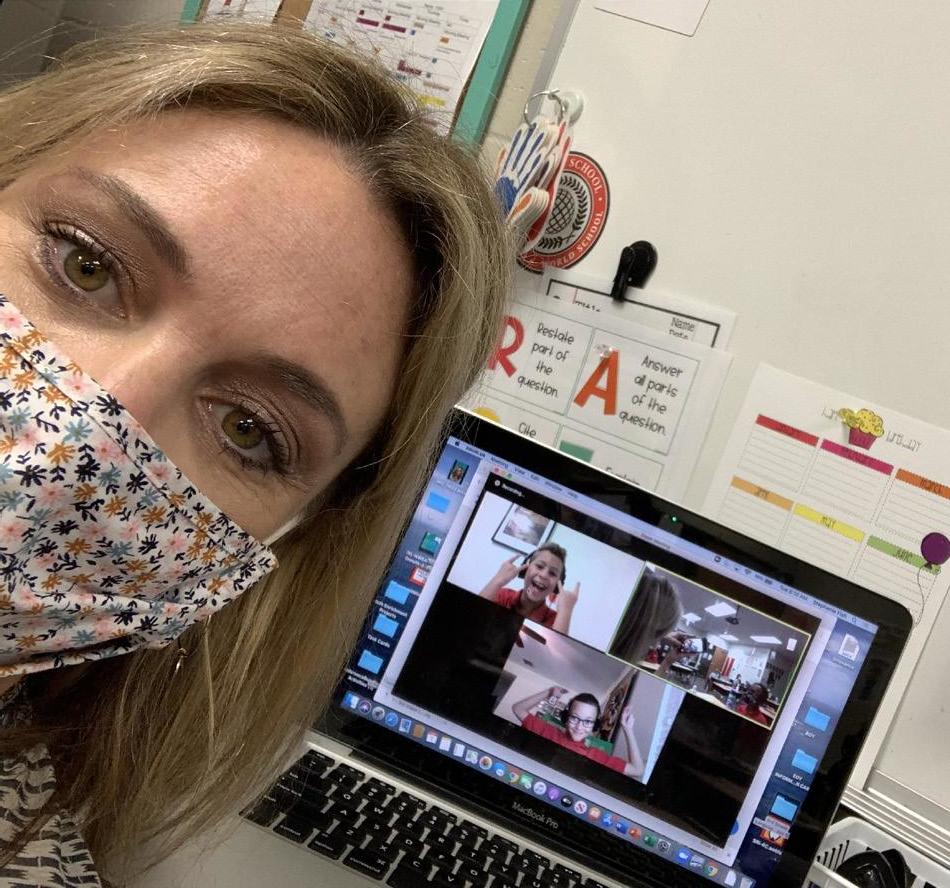
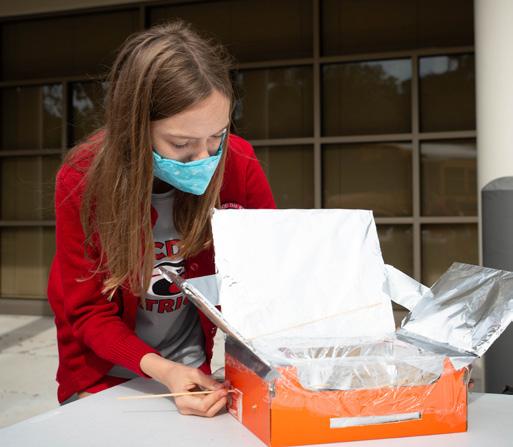
HOW IS IT GOING WITH ALP?
Since Spring 2020, our teachers and students didn’t waste a minute adapting to our Adaptable Learning Plan (ALP). While challenging to hybrid teaching, our CDS teachers have risen to the challenge to keep their ALP students connected and engaged. The good news is that 94% of our elementary students are back on campus, with more showing up every day.
Solar Powered S’mores!
With the weather dropping below the ‘90s in Tampa for a “cool” day, CDS 5th graders weren’t sure their smores would melt in their homemade solar ovens. The ovens were a sea of tin foil as the students set them up carefully at 10 am. They then went back to class and wondered if they had done enough to come back to a melted treat.
After studying energy in this month’s science Unit of Inquiry, students were tasked with creating their own solar ovens that would use thermal energy to cook their smores. Fifth graders learned about heat transfer, convection, conduction, and insulation in preparation for their assignment. They read about groups such as the Solar Cookers International (SCI) and the environmental group Earthwatch who have brought solar ovens to countries all over the world with the goal of creating a safe, pollution-free way to cook.
Noon came quickly for the excited CDS 5th graders and they rushed out to see if the cooking was complete. There were smiles and giggles as one by one they pulled out their messy treats to find their ovens had been successful.
Thank you to the CDS 5th-grade teachers, Mrs. Monty, Mrs. Rodriguez, Mrs. Youngblood, Mrs. Viera, & Ms. Haywood, for facilitating this lesson. It was a delicious one!
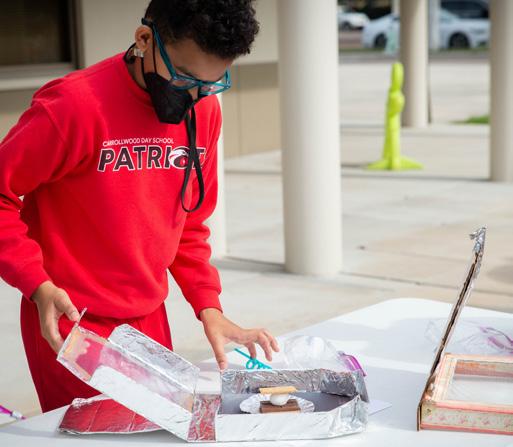
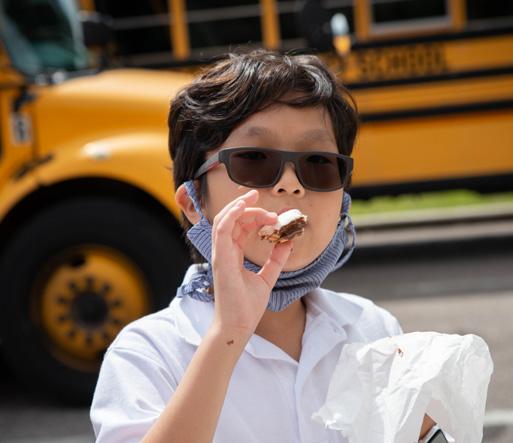

HOW CDS MIDDLE SCHOOL IS BRIDGING THE GAP
The middle school Shakespeare Festival is a CDS tradition that everyone from faculty to students looks forward to each year. This year the format for the student created presentations was expanded. In addition to skits, students created presentations and projects representing life in the Elizabethan Era. During Shakespeare Festival, these projects created by the students were on display and student performances and presentations moved to the pavilion for a true “Shakespeare in the Park” experience. Shakespeare Festival is the culminating activity for our MYP units on Shakespeare. The students write and direct their own plays based on the original works they have been reading and discussing in Language and Literature class.
Throughout the Shakespeare unit, 6th graders enjoyed reading sonnets and discussing how elements of Shakespeare’s language are still present today. 7th graders read Shakespeare’s Hamlet and analyzed the title
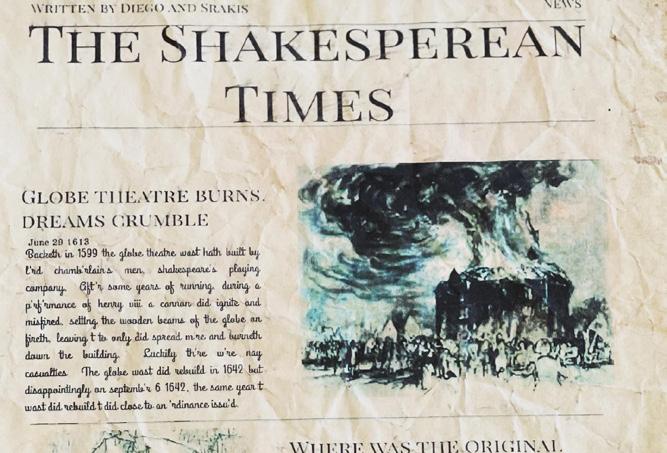
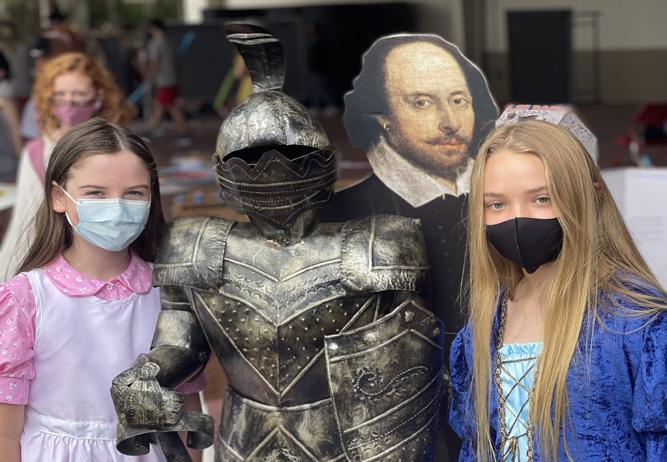
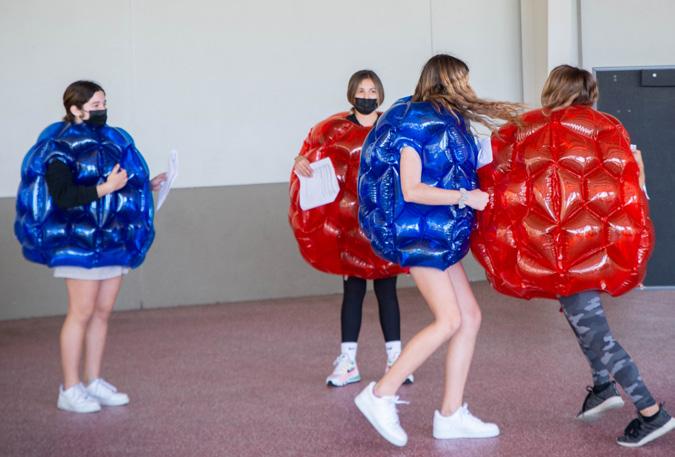
EVEN A PANDEMIC CAN’T STOP THE LONGSTANDING TRADITION OF THE SHAKESPEARE FESTIVAL!
character’s internal conflict and tragic flaws. 8th grade students read Shakespeare’s Romeo and Juliet and analyzed different film adaptations of the play.
The goal of the students introduction to Shakespeare and the subsequent Shakespeare Festival is to celebrate creativity and demonstrate how Shakespeare’s works and the achievements of the Renaissance are still relevant today.
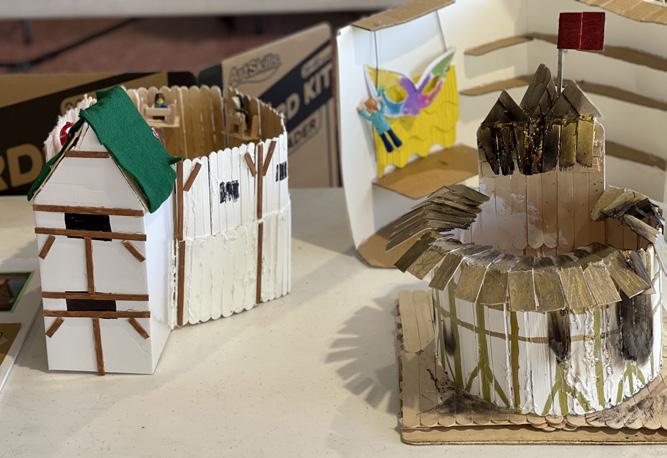
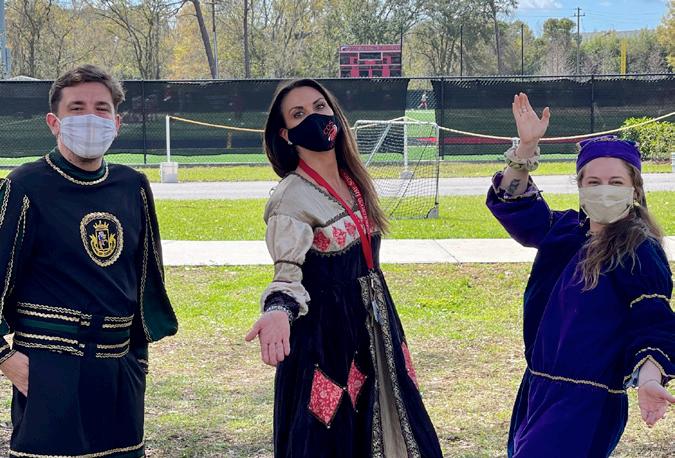

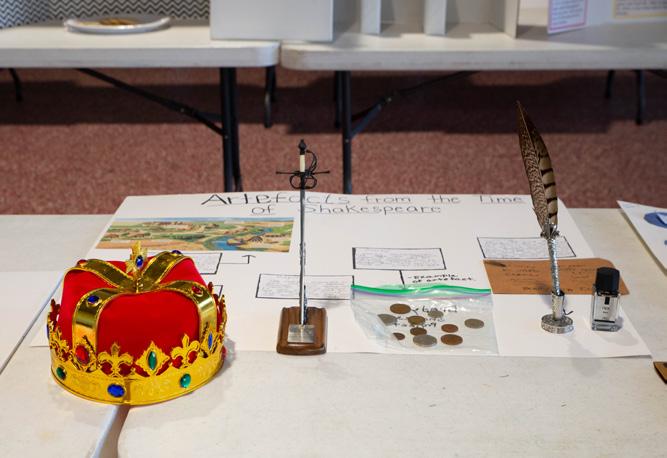
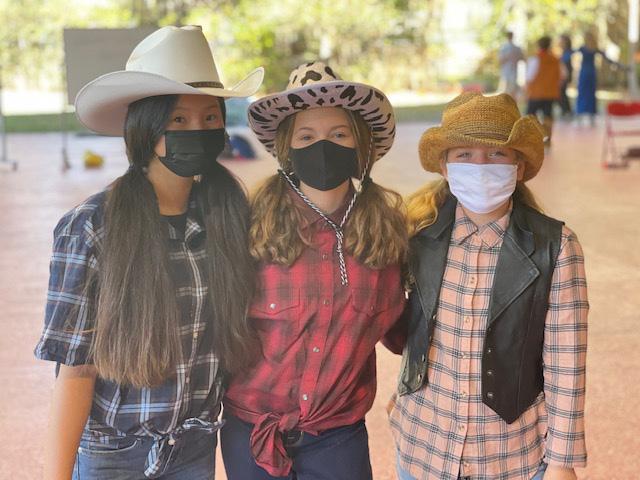
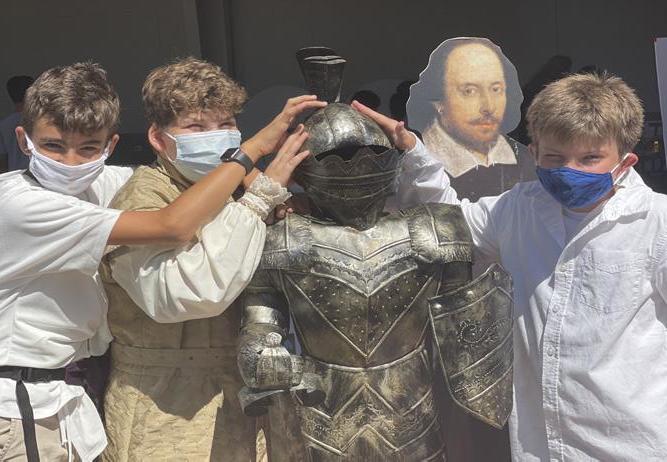
E B I T
ENTREPRENEURSHIP BUSINESS INVESTMENT TEAM
A new middle and upper school club offers students the opportunity to learn life-long skills in the world of business, investment, and the true spirit of entrepreneurism from global leaders!
The Entrepreneurship Business Investment Team (E.B.I.T.) has started with Forbes 400 member and serial entrepreneur, Todd Wagner, at the helm, with the purpose of connecting our Patriot students with experts in various industries who know what it takes to be an entrepreneur in the 21st century. With world leaders in the entrepreneurial, business, and investment fields as potential speakers, CDS students have an unparalleled opportunity to gain insight and education from some titans of industry. Students will not only learn how to take a business from idea to reality but will also glean information about the intricacies of a business and the various ways to invest.
With our ever-changing world, at CDS we feel it is important to cultivate our students’ creativity and offer as many opportunities to grow in their fields of interest. After all, these are the entrepreneurs who will be creating the innovation of tomorrow. Just before the Winter break, CDS 8th grade Language and Literature students were virtually visited by Dr. Luke Berryman from The Ninth Candle. The Ninth Candle is a non-profit organization based in Chicago, Illinois, whose mission is to end anti-Semitism by sharing knowledge.
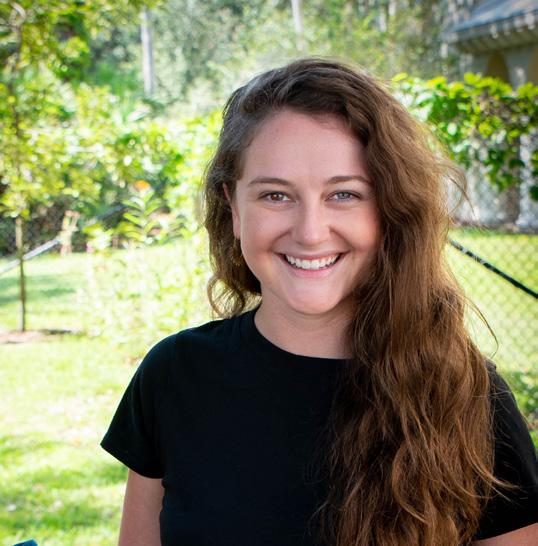
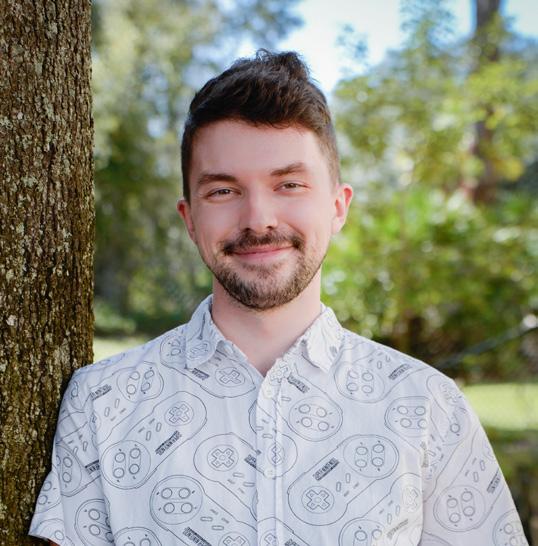
Dr. Luke Berryman spoke to the students on why Berek Lajcher, Ala Gertner, and Alexander Pechersky’s stories matter. In all three cases, these individuals rebelled against the Nazi regime during the Holocaust. He discussed how these individuals’ stories are not taught in the classroom when it comes to Holocaust education and how problematic it can be to omit these heroes from history. Dr. Berryman ended his presentation by speaking on the importance of Holocaust education and the responsibility of future generations to speak out against anti-Semitism and hate speech.
Below are some student reflections from Dr. Berryman’s presentation. “I first learned about the rebellions in some of the camps including Auschwitz. I also never knew that most of the Nazi soldiers were never even punished. This makes me feel that they were a disgrace for doing bad and still had a decent life.” - Jai
“During this presentation, I learned that there were many brave Jewish people who tried to fight the Holocaust. Another thing I learned is that pop culture often misinterprets history, which includes the Holocaust. I also learned that there are still pictures and evidence of the Holocaust that is still being unearthed today.” - Gibson
“Dr. Berryman’s presentation was very eye-opening and enlightening. I learned a lot about Jewish resistance during the Holocaust and how some people were brave and tried to stand up in times of great terror, pain, and suffering. I also realized how the Holocaust’s impact cannot be determined because its repercussions are still being felt today. One thing that really stuck with me is that the Jewish people were seen as ‘weak lambs’ but that is not true, and justice from the Holocaust is difficult to answer/determine because the Holocaust was very terrible, and complex.” - Samantha “In the presentation, we went over Jewish rebellions in different camps. Brave rebels would do whatever they can to support this. From gathering gunpowder to luring in officers. These acts would lead to Jews escaping. Unfortunately, not all would survive the end of the war. “ - Luke
programming. ----------------------
Thank you to Mr. Sandoval, 8th grade Language and Literature teacher, for facilitating this virtual visit and to Dr. Berryman and The
Ninth Candle for creating the educational
NEW FACES
KAILEY HAK Middle School Language & Literature
MARCUS BREITIGAM Middle School Design Technology
Mr. B, as he is known to his students, started at CDS in the Winter of 2020. Self-admittedly, he gets way too excited about Design and Technology. Every day is something new to learn with both topics. Having taught Montessori and IB Design at Waterfront Montessori, he led a successful program that had kids making their own games, concepts, and lifelong desire to push their creations to the next level.
Marcus’ main goal is to encourage students to ask questions about everything in this world. During the COVID-19 quarantine, he tapped into his creative juices by designing Video Games. Kailey Hak is a Tampa native and CDS alum! She completed her undergrad at the University of Colorado in Business Administration and Accounting Ethics. Always interested in education and traveling, she moved to Asia to teach English in 2016 where she developed her passion for teaching. She has worked as an educator in International Schools in Bangkok and non-profits internationally in Thailand and Nepal. More recently she has worked with Nepali youths to develop greater access to education in the Himalayan Region of Nepal, where she advised on the development of a locally led language and arts community center program. Throughout her years working within education she has developed an interest in character building and peace education, which has led her to pursue a Masters Degree in Education and Spring 2020 TalonDevelopment from the University College London.
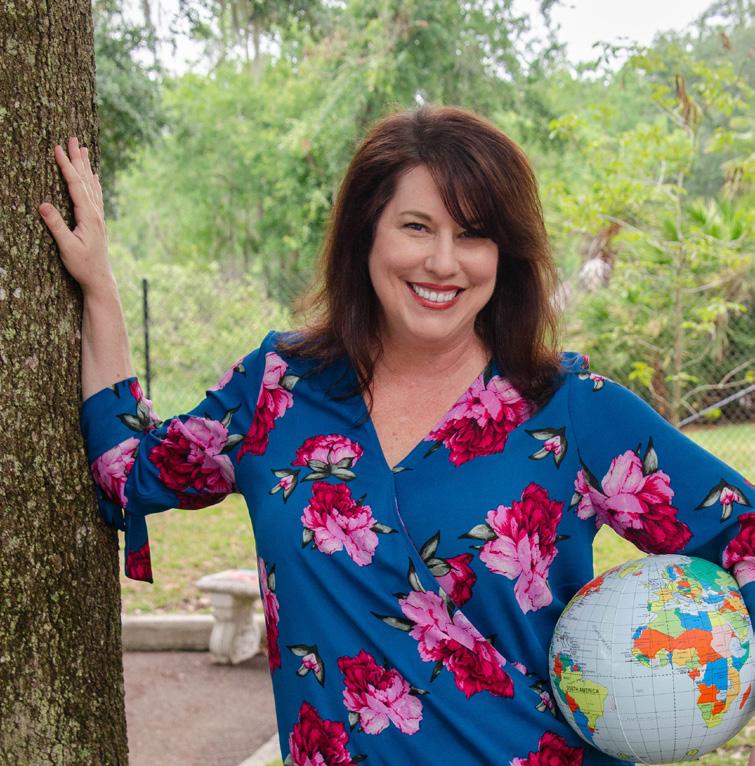
INNOVATION AT EVERY TURN IN THE
UPPER SCHOOL
The Self-Paced Classroom
By Kelly Benedetti, Upper School Humanities Teacher and Department Chair
In November of 2020, my beat down teacher’s soul, like so many in our field, did not know it was about to be revived and galvanized. Strategizing to simultaneously support the dailychanging combinations of students online and students on campus had become a mission for us and for educators around the world.
A podcast that informs so much of my practice, titled “Cult of Pedagogy” by Jennifer Gonzalez, featured Kareem Farah on its November 8th episode. Mr. Farah is an award-winning former IB Math teacher and founder of The Modern Classrooms Project non-profit, but he was unknown to me until that day.
The podcast was titled “How to Create a Self-Paced Classroom,” and the elusive vision and structure I had pursued for 20+ years crystallized in the 48 minutes of this episode #158. I shared it with several colleagues, and I was enthralled when Ms. Sabrina McCartney expressed her enthusiasm to experiment with me!
I have always noodled with flexible deadlines and have focused yearly on differentiation, collaboration, and the self-management skills development that are at the heart of the self-paced classroom. However, my approach always felt fragmented. I lacked the expertise, time, skill-sets, or vision to really pull it off. It was demoralizing, but I continued its pursuit with the understanding that it would take potentially years to gel, if I could pull it off at all. And then, Mr. Farah laid it all out, 48 minutes of podcast interview in which he articulated a workable framework for immediate development and implementation.
My perusal of The Modern Classrooms free course outlined the basics:
1. Learning Module Structure with Options for Students 3. Explanation of the Self-Paced Model for Instructors and Students
STUDENT REFLECTIONS OF THE SELF-PACED MODEL
“It allows us to grow in our ability to learn independently, which will probably be very helpful for life after high school. Also, it allows all of us to work at our own pace, so if I want to get ahead in my assignments so that I don’t have homework in global politics for the next two weeks, I can. On the other hand, if I’m having an off day or I have too much due the next day to be able to meet the recommended deadline for an assignment, there’s flexibility so I just have to catch up a bit later.”
“The self-paced assignments are something that requires trust from both the teachers and the students. This way of working isn’t always able to work in every classroom, however, it works for our class because we have trust in our teacher and in ourselves.”
“The idea of “self-paced” is not one of limiting stress, although it does, but to promote free thinking. We find our own ideas and not just accept what is given. We have to form our own opinions on tough topics. In this way we are best prepared for life later on.”
“The self-paced model allows students to learn the required material and dive into the parts that intrigue them while also building self-management skills”
“I really like the self-paced model, because it is SELF-PACED”
“It works, it just works”
“Your work ethic defines you.” “Although innovative and experimental, the self-paced model has shown to not be compatible for all students and students can have a greater opportunity to fall behind.” recommendations. They will be my lead consultants as we continue to fine-tune this model, a model that appears to be serving a high percentage of the Global Politics students meaningfully and effectively.
This pandemic has ground students, families, educators, non-teaching staff, administrators, and people around the world down to nothing, at different times and in different ways. But, in that pulverization there is enormous opportunity to review, revise, rebuild, and reimagine both institutional and classroom structures.
I have so much to learn in the pursuit of teacher-craft, and it will be a careerlong quest as the demands of this work intensify and diversify with increasing multidimensionality.
I am deeply indebted to our administration, my colleagues, and especially the learners and families of the GloPo classes of 2021 and 2022 for their courage in exploring this model with me. I also thank the administration for bankrolling my enrollment in the June-July Modern Classrooms monthlong summer institute. It, too, is a blended self-paced model that will pair me with an accomplished practitioner of this classroom structure. My profound hope is that it will elevate my practice to the extent that no Global Politics students’ needs ever go unmet.
The students’ enthusiasm, support, candor, fearless spirits of experimentation, and ongoing consultancy are what will ensure that this model meets learners where they are, that they feel supported and not abandoned in a model that de-centers the instructor, and that they leave this institution with the self-management skills that university and professional life will demand.
HOSA is an international student organization recognized by the U.S. Department of Education and the Health Science Education (HSE) Division of ACTE. HOSA’s two-fold mission is to promote career opportunities in the health care industry and to enhance the delivery of quality health care to all people.
At Carrollwood Day School, the members of HOSA are not only developing leadership and technical HOSA skill competencies, but they are consistently upholding the goals that HOSA believes vital.
• To promote physical, mental, and social well-being. • To develop effective leadership qualities and skills. • To develop the ability to communicate more effectively with people. • To develop character. • To develop responsible citizenship traits. • To understand the importance of pleasing oneself as well as being of service to others. • To build self-confidence and pride in one’s work. • To make realistic career choices and seek successful employment in the health care field. • To develop an understanding of the importance of interacting and cooperating with other students and organizations. • To encourage individual and group achievement. • To develop an understanding of current health care
issues, environmental concerns, and survival needs of the community, the nation, and the world. • To encourage involvement in local, state, and national health care and education projects. • To support Health Science Education instructional objectives. • To promote career opportunities in health care.
Most recently, CDS HOSA members competed virtually in various subjects.

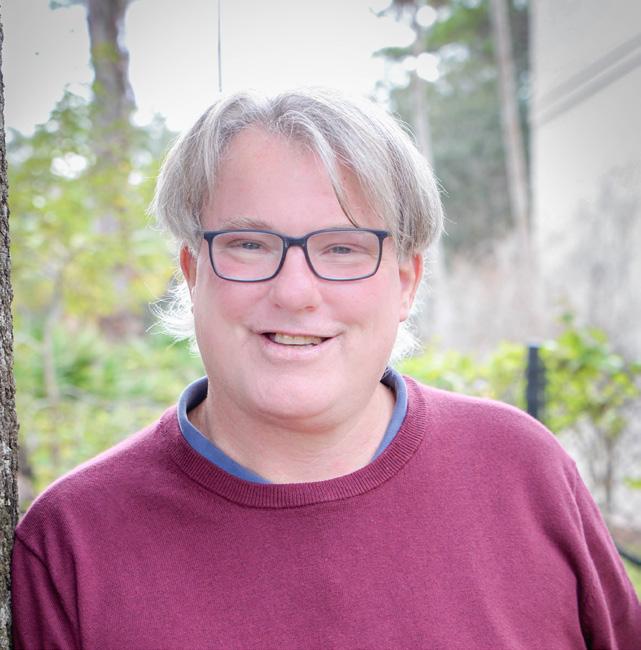
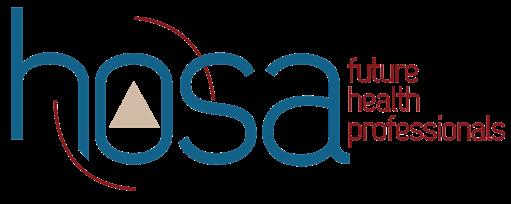
National Beta members and CDS seniors, Libby M., Meredith S., Katie M., and Chloe W. are celebrating their recent participation in the Southern Virtual Leadership Summit. They were announced as National Qualifiers in the Leadership Challenge competition where Beta members were tasked with submitting a 2-minute video addressing a real-world challenge.
This year’s challenge focused on the digital divide in our nation that was brought into focus nationally by what the educational community experienced during the COVID pandemic. Beta members were asked to tackle the question of “What action can you take to bridge the gap to ensure internet access and success for all students?”
Typically, National Beta Leadership Summits bring together students from multiple states for 1-2 day events. During that time, students work with interactive speakers who engage members through introspective exercises and team-building activities. Clubs can also participate in team-based leadership challenges which test their communication, critical thinking, creativity, presentation, and collaboration skills. While the Leadership Summit, originally planned to be held in Georgia, was canceled for in-person attendance due to health and safety concerns stemming from the COVID-19, members were able to work together to submit their challenges online and met virtually for interactive leadership training from Bill Cordes and Ted Weise.
These four CDS seniors didn’t let the virtual format stand in their way and now their success at this level provides them with the opportunity to compete at the national level. National Convention will be held at the Swan and Dolphin Resort at Walt Disney World in Orlando, Florida during Summer 2021.
NEW FACE
EDWARD JURCZAK Upper School IB Chemistry
Edward Jurczak comes to CDS with multiple years of industry experience as a chemist in Pennsylvania where he published numerous articles and holds a patent for Cyclic Amine Acrylate Monomers and Polymers. Edward returned to his roots in Florida to begin sharing his knowledge with students. He has taught both physics and chemistry at the middle and high school level in Hillsborough and Pasco counties. Edward is looking forward to teaching using the International Baccalaureate curriculum as it blends the knowledge content and hands on laboratory skills that he sees as necessary to provide a well rounded understanding of chemistry.

FROM THE DEPARTMENT OF
COLLEGE COUNSELING
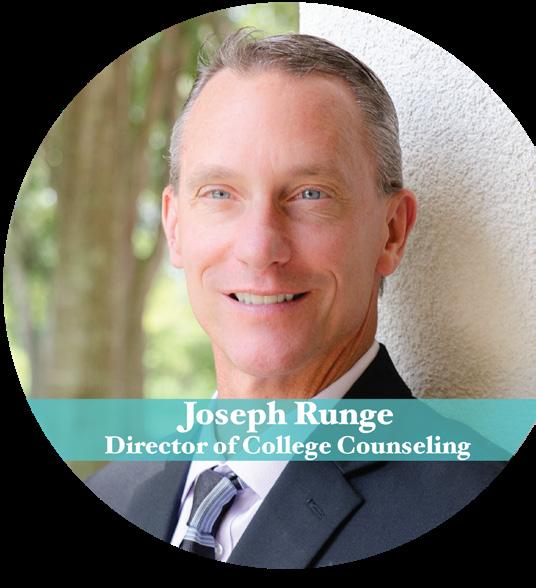
When I think of the class of 2021, all that comes to mind is “Wow.” This is the first class with whom I have had the privilege of working through the entire four-year college counseling developmental program, and their college admissions results are quite impressive; I might say, “the best in the history of CDS graduating classes.” There are approximately 40% of the decisions on record (with many more to come this spring) but the results are magnanimous. Allow me to opine.
More than 970 applications have been submitted for the class of 2021 (98 seniors). We have received 408 acceptances versus only 13 denials at this point (a 97.0% acceptance rate). In addition, total merit scholarship dollars already awarded totals over $10,000,000, which is significantly ahead of pace of previous years’ classes. As for admissibility, I am quite sure more is to come.
We had almost 20% of the senior class apply Early Decision (which is a binding commitment); that represents a 300% increase from the class of 2018. Those seniors who were admitted through the binding Early Decision commitment process represent the following colleges:
• Brown University • Cornell University • Emory University • NYU • Boston College • Tulane University • RPI (Rensselaer Polytechnic Institute) • Villanova University • Northeastern University (2) • Spelman College • Emerson College In addition, of all senior students who applied Early Decision, 95% applied to colleges out of state/out of region.
Carrollwood Day School has had 5 students admitted to Ivy League universities in the past three years (Cornell University=3, Dartmouth College=1, Brown University=1), which represents the first 5 students admitted to Ivy League universities since Carrollwood Day School’s founding.
I would also be remiss if I did not mention other notable Early Action (non-binding commitment) colleges to which our class of 2021 students has been admitted (top 100 US News and World Report Rankings). They are:
• University of Notre Dame • University of Virginia (3) • Georgia Institute of Technology • USC (University of Southern California) • UNC @Chapel Hill • Case Western Reserve University • Tulane University (4 students) • University of Texas (3 students) • Villanova University (3) • Northeastern University (3) • University of London- UK (World
University Rank=19) • University of Glasgow- Scotland (World
University Rank=89) • University of Miami (11) • University of Richmond • University of Georgia (11 students) • Santa Clara University (2 students) • University of Maryland (2) • Spelman College (2) • Howard University (2) • The Ohio State University (3 students) • Penn State University (2 students) • Loyola Marymount University • Fordham University (2 students) • Southern Methodist University (5 students) • University of Massachusetts (2 students) • Virginia Tech University (2 students) • Baylor University (3 students) • Indiana University (5 students) • Texas Christian University (5 students) • Michigan State University (2 students) • Elon University (2 students) • University of Delaware (2 students) • University of Arizona (3 students)
Our Scholar-Athletes have also acquitted themselves in admirable fashion thus far. Please note the following young men and women who have accepted Division I/II athletic opportunities to attend college (as of this writing):
• Mason A. (Football): The Ohio State
University • Jalyn B. (Volleyball): American
International College • Aryana D. (Women’s Basketball):
University of Vermont • Desmond M. (Football): Virginia Tech
University • Gia P. - (Volleyball )The University of
Akron, • Michael T. (Football & Basketball): USC
From a geo-demographical standpoint, it is always interesting to view where CDS students are pursuing post-secondary school options.
• 97% of seniors applied to at least one college out of state • 95% of Early Decision seniors applied to college out of state • 58% of seniors applied to college in the
Northeast • 37% of seniors applied to college in the
Midwest
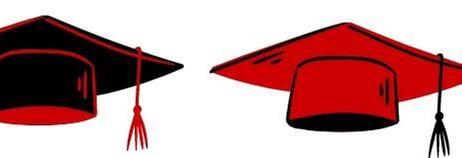
• 37% of seniors applied to college in the West • 76% of seniors applied to college in the South (outside of the state of
Florida)
The geographical distribution of applications (and thus interest) necessitates that as Carrollwood Day School matures into a more seasoned IB/Cum Laude Society independent school, the vast majority of our student constituency is taking a more national view of college admission.
There are many more colleges to which seniors have been accepted and we will surely report all of them (and all student success stories) when all decisions have been adjudicated in the spring.
Congratulations to all seniors thus far and an abundant thanks to the college counseling staff whose presence and effort stands behind every acceptance!
• Mrs. Dawn Bickoff/ Senior Associate
Director of College Counseling • Mr. Drew Guarino/ Senior Associate
Director of College Counseling • Ms. Danielle Cohen/ College
Counseling Associate
Additionally, I would be remiss if I didn’t profusely thank and acknowledge the entire CDS faculty who have taught and spent an inordinate amount of time with our current seniors throughout their academic tenure. In addition to their mastery of instruction and willingness to help students outside the classroom, the upper school faculty wrote approximately 200 letters of recommendation to support our seniors through the application process. Without their assistance, our final results would be less than what they are today. Thank you!
Joe Runge Director of College Counseling

